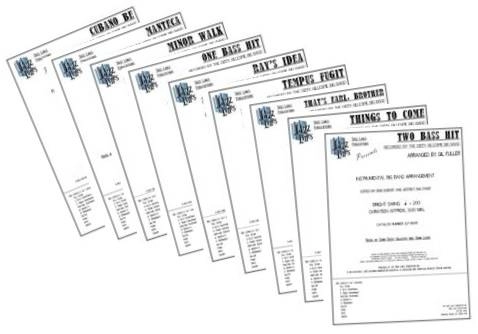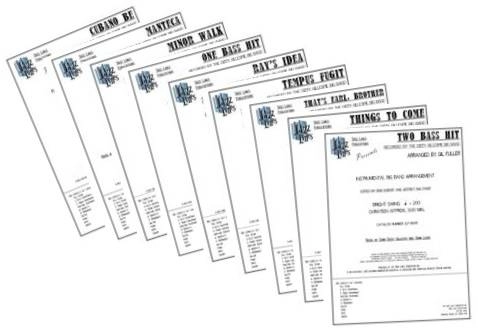Opens in a new window
Jazz Lines Publications Dizzy Gillespie Big Band Jazz Lines Publications Series: Complete Set Of Nine Arrangements - Fuller/Russell - Jazz Ensemble - Gr. Medium to Advanced

- Composer/Author: GILLESPIE, DIZZY
- Instrumentation: JAZZ ENSEMBLE
- Model # JLP-1010
Arrangers: Gil Fuller, George Russell
Format: Score and Parts
Instrumentation: Jazz Ensemble
Styles: Various
Level: Medium to Advanced
All nine of the Dizzy Gillespie Big Band charts published by Jazz Lines are now available in a specially-priced complete set!
All of these were written for Dizzy's mid-to-late 1940s bebop big band, and six of them were recorded.
They are all also available individually.
Cubano Be
Style: Afro-Cuban
Level: Difficult
This ground-breaking arrangement was written by George Russell in 1947 for the Dizzy Gillespie Big Band. It was first recorded live at Carnegie Hall then recorded at one of the last sessions Dizzy Gillespie made for RCA Victor in 1947 (before another recording ban took place during most of 1948). The importance of Cubano Be (and its sister piece, Cubano Bop) is that it signalled to the music community that Afro-Cuban rhythms (and Latin influences in general) could be merged with jazz. Through these performances and recordings, Afro-Cuban arrangements found their way to the concert hall. In 1949 J.J. Robbins & Sons published a stock arrangement of this tune that was nearly identical to the arrangement from Dizzy's book. The only major difference was that the published version was for 3 trumpets instead of 4. Jazz Lines has recreated the 4th trumpet part.
Manteca
Style: Latin
Level: Medium
This famous arrangement was written by Gil Fuller and recorded at one of the last sessions Dizzy Gillespie made for RCA Victor in 1947, before another recording ban took place during most of 1948. Manteca was co-written by Dizzy Gillespie and Chano Pozo in 1947 and became one of the first examples of Afro-Cuban influences being incorporated into jazz. In 1949 J.J. Robbins & Sons published a stock arrangement of this tune that was nearly identical to the arrangement from Dizzy's book. The only major difference was that the published version was for 3 trombones instead of 4. Jazz Lines has re-created the 4th trombone part.
Minor Walk
Style: Swing
Level: Difficult
This arrangement was recorded at one of the last sessions Dizzy Gillespie made for RCA Victor in 1947, before another recording ban took place during most of 1948. In 1949 J.J. Robbins & Sons published a stock arrangement of this tune that was nearly identical to the arrangement from Dizzy's book. The only major difference was that the published version was for 3 trumpets instead of 4. Jazz Lines has recreated the 4th trumpet part.
One Bass Hit
Style: Swing
Level: Medium Difficult
This arrangement by Gil Fuller was written to showcase Ray Brown, the bassist of the Dizzy Gillespie Big Band. Gillespie's big band performed this arrangement many times over the years. In 1949 J.J. Robbins & Sons published a stock arrangement of this tune that was nearly identical to the arrangement from Dizzy's book. The only major difference was that the published version was for 3 trumpets instead of 4. Jazz Lines has restored the 4th trumpet part. The bass fills have not been written out, allowing for your bassist to improvise over the provided chord changes.
Ray's Idea
Style: Swing
Level: Difficult
This arrangement by Gil Fuller was first recorded by the Dizzy Gillespie big band in 1946. In 1949 J.J. Robbins & Sons published a stock arrangement of this tune that was nearly identical to the arrangement from Dizzy's book. The only major difference was that the published version was for 3 trumpets instead of 4. Jazz Lines has recreated the 4th trumpet part. Featured are solos for trumpet, tenor saxophone, and trombone. An optional open solo section has been included.
Tempus Fugit
Style: Swing
Level: Advanced
This arrangement was written by Gil Fuller for Dizzy Gillespie's bebop big band of the late 1940s; however, this arrangement was never recorded. Solos are featured for alto sax and trumpet.
That's Earl Brother
Style: Swing
Level: Medium
This arrangement was written by Gil Fuller for the Dizzy Gillespie Big Band in the late 1940s but it was never recorded. The song was previously recorded as a sextet version in 1946. In 1949 J.J. Robbins & Sons published a stock arrangement of this tune. The only major difference between the published version and the Gillespie band version was that the published version was arranged for 3 trumpets instead of 4. Jass Lines has re-created the 4th trumpet part.
Things to Come
Style: Swing
Level: Advanced
Big band repertoire really doesn't get much more difficult than this arrangement. Taken at a blistering 300 bpm, this band showcase was arranged by Gil Fuller for Dizzy Gillespie's bebop band of the mid to late 1940s. Gillespie's big band performed this arrangement many times and it was used as a band theme. In 1949 J.J. Robbins & Sons published a stock arrangement of this tune that was nearly identical to the arrangement from Dizzy's book. The only major difference was that the published version was for 3 trumpets instead of 4. Gil Fuller recreated this arrangement for Dizzy's big band of the 1960s (the original music was lost). Jazz Lines has restored the 4th trumpet part (from Dizzy's set of 1960s parts) and included backgrounds that were not included in the stock. Solos are featured for trumpet, piano, alto sax, and tenor sax. The alto sax solo may be used as an open solo section.
Two Bass Hit
Style: Swing
Level: Medium Difficult
This arrangement was recorded at one of the last sessions Dizzy Gillespie made for RCA Victor in 1947, before another recording ban took place during most of 1948. In 1949 J.J. Robbins & Sons published a stock arrangement of this tune that was nearly identical to the arrangement from Dizzy's book. The only major difference was that the published version was for 3 trumpets instead of 4. Jazz Lines has recreated the 4th trumpet part.
Media
Cubano Be
Press play to listen
Manteca
Press play to listen
Minor Walk
Press play to listen
One Bass Hit
Press play to listen
Rays Idea
Press play to listen
Tempus Fugit
Press play to listen
Things to Come
Press play to listen
Two Bass Hit
Press play to listen
Q & A
There are currently no questions for this product.
Reviews
There are currently no reviews for this product. Be the first to write one!




